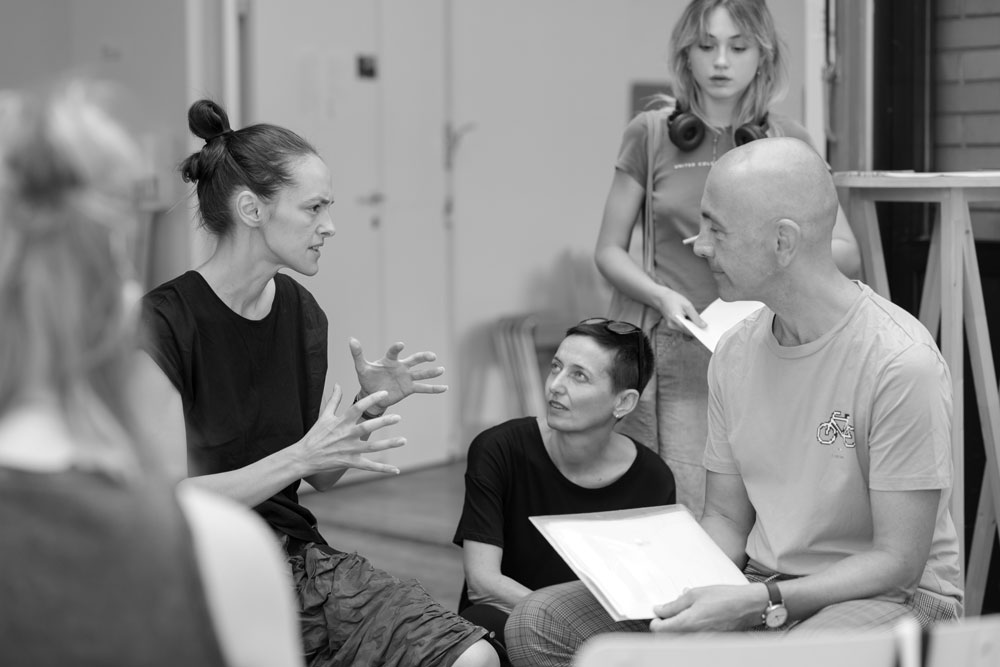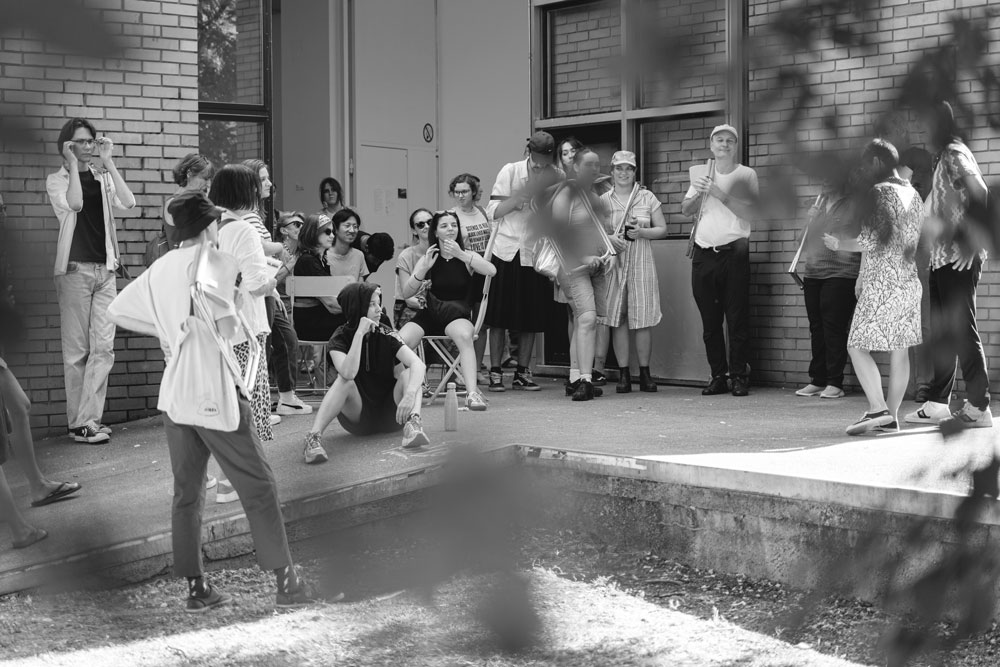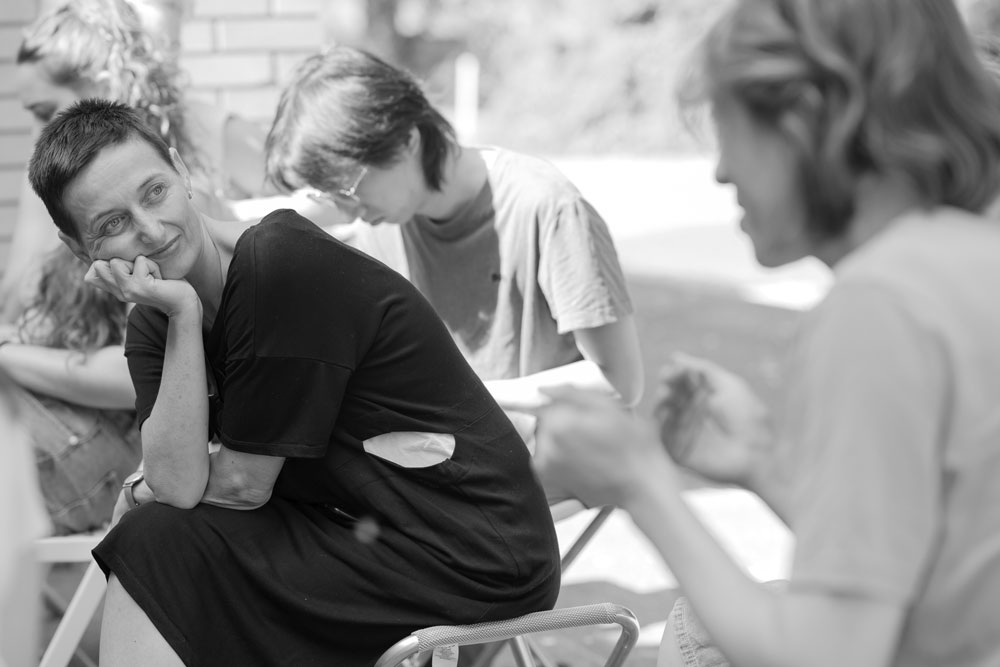Exchange Week August 2024
The Arts of Resistance
24.8.2024 – 2.9.2024
During this 10-day Exchange Week in Vienna, young people from different countries and backgrounds met, exchanged and discussed resistance against fascisms. This community of learning included young people, artists, artist-researchers, activists, scholars, and members of art institutions (Youth Club, MSU Zagreb; students of HKB Braunschweig, students from University of Applied Arts; artists from Office Ukraine-Support for Ukrainian Artists Network) who share a common concern and interest in cultural expressions of resistance. They engaged in collective critical inquiry and creative reflection. This exchange week explored resistance against fascisms as a performative, artistic, transcultural, historical, activist, and educational instrument of realizing (European) community. Renowned artists, curators, education experts, and scholars hailing from Europe, the US, India, Iran and Israel discussed openly artistic, activist, and communal possibilities of fighting fascist tendencies. The 10-day event assembled excellent artistic, curatorial and educational practices with divergent perspectives on the topic - from remembrance cultures to art to activism - to develop a new imagination of cooperation beyond friction, polarisation, and wars.
This exchange meeting created a platform and basis for cooperation across cultural, historical, geographical, social, and educational differences to address the challenges of the present, specifically how to find a new culture of socio-political and artistic expression of resistance against fascisms while coming together on a European level.
![]()
![]()
![]()
![]()
![]()
![]()
![]()
![]()
![]()
![]()
![]()
![]()
![]()
![]()
![]()
![]()
![]()
![]()
![]()
![]()
![]()
![]()
![]() Photos © eSeL
Photos © eSeL
24.8.2024
25.8.2024
26.8.2024
27.8.2024
28.8.2024
29.8.2024
30.8.2024
31.8.2024
01.9.2024
02.9.2024
The Arts of Resistance is made possible by the generous support:
![]()
![]()
![]()
![]()
![]()
![]()
24.8.2024 – 2.9.2024
During this 10-day Exchange Week in Vienna, young people from different countries and backgrounds met, exchanged and discussed resistance against fascisms. This community of learning included young people, artists, artist-researchers, activists, scholars, and members of art institutions (Youth Club, MSU Zagreb; students of HKB Braunschweig, students from University of Applied Arts; artists from Office Ukraine-Support for Ukrainian Artists Network) who share a common concern and interest in cultural expressions of resistance. They engaged in collective critical inquiry and creative reflection. This exchange week explored resistance against fascisms as a performative, artistic, transcultural, historical, activist, and educational instrument of realizing (European) community. Renowned artists, curators, education experts, and scholars hailing from Europe, the US, India, Iran and Israel discussed openly artistic, activist, and communal possibilities of fighting fascist tendencies. The 10-day event assembled excellent artistic, curatorial and educational practices with divergent perspectives on the topic - from remembrance cultures to art to activism - to develop a new imagination of cooperation beyond friction, polarisation, and wars.
This exchange meeting created a platform and basis for cooperation across cultural, historical, geographical, social, and educational differences to address the challenges of the present, specifically how to find a new culture of socio-political and artistic expression of resistance against fascisms while coming together on a European level.



















Programme
24.8.2024
Arrival in Vienna
25.8.2024
13:00-15:00 Welcome: Introduction to the ZFF, project, programme, and expectations @ ZFF
15:30-17:30 Excursion: PROTEST/ARCHITECTURE Barricades, Camps, Superglue @ MAK
17:30-20:00 Communal Dinner @ ZFF
26.8.2024
10:00-12:00 Opening Workshop: Jo O’Brien, Sustainable Resistance: Slow Beginnings for Durational Action @ ZFF
13:00-15:00 Exchange and Introduction of the hree Groups @ ZFF
15:30-17:30 Workshop Anderwald + Grond: What is Critique? @ ZFF
27.8.2024
10:00-12:00 Excursion @ Documentation Centre of Austrian Resistance (DÖW)
15:30-17:30 Contribution HBK Braunschweig @ ZFF
17:30-20:00 Screening: Aufzeichnungen zum Widerstand (Notes on Resistance), Martin Krenn (Engl. Sub.) @ ZFF
28.8.2024
10:00-12:00 Contribution MSU Zagreb @ ZFF
15:30-17:30 Guided Tour Through the Neighbourhood, Anderwald + Grond @ ZFF
17:30-20:00 Concert and Conversation singer-songwriter Robert Rotifer @ ZFF
29.8.2024
10:00-12:00 The Last Days of Democracy, artist Deborah Sengl with director Barbara Staudinger/chief curator Hannes Sulzenbacher, @ Jewish Museum
12:00- Vienna shows Vienna
30.8.2024
10:00-11:30 Contribution: Preeti Kathudria, Activism and New Perspectives in Indian Contemporary Art:
Response to the Agrarian Crisis @ ZFF
12:00-13:30 Workshop: Gelavizh Abolhassani, Politics and Art. An Iranian Perspective. @ ZFF
15:30-16:30 Workshop: Bezalel Guidelines (Ruth Mateus-Berr, Ruth Anderwald + Leonhard Grond) @ ZFF
17:30-20:00 Roundtable: Art Education in Times of War with Barak Pelman, Liat Brix Etgar, Adi Stern, mod.: Ruth Mateus-Berr, Ruth Anderwald + Leonhard Grond) @ ZFF
31.8.2024
10:00-12:00 Workshop: Introduction to the Collection MSU Museum of Contemporary Art Zagreb @ ZFF
13:00-15:00 Workshop: Exhibition Preparation for May 2025 at MSU Zagreb @ ZFF
15:30-17:30 Screening and conversation: Widerstandsmomente (Moments of Resistance), (Engl. Version), Jo Schmeiser @ ZFF
01.9.2024
10:00-12:00 Wrap-Up: Where do we go from here? (for all participants) @ ZFF
13:00-15:00 Institutions’ Next Steps (Organisation: Exhibition, Publication) @ ZFF
15:30-16:30 Evaluation with Questionnaires @ ZFF
16:30-17:30 Preparing the Party @ ZFF
17:30 Farewell Party @ ZFF
02.9.2024
09:00-12:00 Departure/Clean Up
The Arts of Resistance is made possible by the generous support:






 University of Applied Arts, Vienna
University of Applied Arts, ViennaContributors
Dr.Phil. Gelavizh Abolhassani (IRN) is an Iranian scholar, artist, and visual-graphic designer. She earned her Bachelor’s degree in Visual Art from the University of Science and Culture in Tehran, Iran, and her Master’s degree in Graphic Design and Communication from the University for the Creative Arts in London, UK. She earned her doctorate (Dr. phil.) in Philosophy of Arts from the University of Applied Arts Vienna (Die Angewandte). Her research explores the historical ties between art and theory, with a particular focus on art and artist autonomy in both Iran and Austria. She has showcased her art projects and theoretical artistic research at multiple exhibitions and events, including lectures, across Iran and Europe.
Ruth Anderwald + Leonhard Grond (AT) work as an artist and artistic research collective. Their work has been exhibited internationally, e.g., at Whitechapel Gallery, London, Centre Pompidou, Paris, MAK Vienna, Himalayas Art Museum, Shanghai, or Tate Modern, London. They have curated screening programs and exhibitions at Kunsthaus Graz, U-jazdowski Castle, CCA Warsaw, mumok Vienna or CCA Tel Aviv. Their long-term, cross-disciplinary artistic research projects include Dizziness-A Resource (2014-2017), and currently Navigating Dizziness Together (2020-2024), University for Applied Arts Vienna, funded by the Austrian Science Funds; and The Construction Site of Remembrance, in connection to the renewal of the Austrian Exhibition at Memorial and Museum Auschwitz-Birkenau, Poland (2018-2021) is commissioned by the Austrian National Funds.
Selma Banich (CRO) is a performing artist, born in Yugoslavia and lives in Zagreb. She has worked independently and in collaboration with other artists, curators, groups, and initiatives in the Balkans, across Europe and in the US. She creates in the medium of performance art, through actions and interventions in the public space, and engaged public practices in communities. She was previously involved in numerous dance, theater and opera productions as a choreographer. She also performs on film. Art films she was engaged in were screened worldwide. Her artistic and social practice is based on processual, research and activist work and is politically inspired by anarchism and feminism.
Liat Brix Etgar (ISR) is an architect and educator who is currently the vice president of academic affairs at Bezalel. She established and led the Arts and Design Teaching Center at Bezalel and the Civic Architecture Unit at the School of Architecture. The Civic Architecture Unit focuses on civic education and creating platforms for partnerships with residents, planning organizations, and civil society organizations in Israel to promote social, environmental, and economic justice through planning and design tools. Liat holds a degree in architecture from Bezalel Academy of Arts and Design Jerusalem and an MA from the Cohn Institute for the History and Philosophy of Science and Ideas at Tel Aviv University (summa cum laude), where she wrote her thesis about the Spatial-Political Lexicon of Jean Luc Nancy. In addition, she is a founding partner of Etgar Null Architects studio based in Tel Aviv.
Jo O’Brien (US) is an artist, educator, and researcher whose work explores the queer-crip potential of confusion as both a form of resistance and call for collaboration. Their artistic research practice includes material and social forms of art-making, and access-oriented pedagogy and community building in the University context. Jo’s work is often collaborative, and their pedagogical research has been supported through fellowships and grants. Their doctoral project at the University of Applied Arts Vienna examines the relationship between legibility and illegibility, confusion, and community. Jo is also a Lecturer in the Faculty of Culture and Community at Emily Carr University of Art + Design.
Preeti Kathuria (IND) is a writer, curator and researcher. She holds post-graduate degrees in History of Art from the National Museum Institute, New Delhi and in Curating Contemporary Art from the Royal College of Art, London. She has worked as Assistant Editor, Contemporary Art with the Lalit Kala Akademi (National Academy of Art), New Delhi and has been writing on contemporary art for various art journals and magazines. Besides critical writing and editorial work, she has taught visual art at several universities and colleges. At present she is a PhD researcher at the University of Applied Arts, Vienna.
Martin Krenn (AT) is an artist, artistic researcher and curator. He works as a professor of art mediation/education at the Institute of Fine Art, Braunschweig University of Art and as a lecturer at the Vienna Master of Arts in Applied Human Rights at the University of Applied Arts Vienna. Krenn uses various types of media, including text, photography and video. Most of his projects in public space take the form of social sculpture. By consistently expanding the field of art, he tries to initiate discussions about socio-political topics and thereby challenges conventional thinking.
Ruth Mateus-Berr (AT) is an Austrian conceptual artist. She has created drawings, paintings, sculptures, videos, installations, performed and worked with various media. She is a professor at the University of Applied Arts Vienna and also a multi-sensual design researcher, always exploring new fields. Her award-winning works deal with artistic research, critical design, digital humanism, the social development goals, urbanism, art & dementia and health. Her latest artistic research project "DEMEDARTS" (funded by FWF PEEK AR-609) aims to awaken more empathy for people with dementia in our society.
Barak Pelman (ISR) is a senior lecturer at the Bezalel School of Architecture and the director of the Hybrid Pedagogy Lab, an interdisciplinary research initiative dedicated to advancing the theory and practice of art, craft, and design education. Barak is a member of Bezalel's Art and Design Teaching Center, where he develops workshops for design learning and is part of the team that developed Bezalel guidelines regarding freedom of expression and creation.
Robert Rotifer (AT) is an Austrian musician, music journalist and radio presenter living in Canterbury. His grandmother is the resistance fighter, politician (KPÖ) and philanthropist Irma Schwager. The video for The Frankfurt Kitchen a combination of live-action film and Rotifer's paintings animated by Lelo Brossmann (Heinz aus Wien), was presented at New York's Museum of Modern Art in 2010 and has been included in the collection there.
Jo Schmeiser (AT) explores the interfaces of art, film, theory, and politics. She often works collectively, focusing on issues including racism, sexism, and anti-semitism and reflecting critically on their form and structure. Films: WIDERSTANDSMOMENTE/MOMENTS OF RESISTANCE (Plaesion Film: 2019, A/D), LIEBE GESCHICHTE/LOVE HISTORY (Klub Zwei: 2010, A). Publications: Conzepte. New Versions of Political Thought (www.conzepte.org: 2015)
Deborah Sengl (AT) is an Austrian painter and artist. For her museum presentation the Austrian artist Deborah Sengl has created an installation that combines history, literature and contemporary art in an extraordinary way. With some 200 stuffed white rats, she is staging The Last Days of Mankind after Karl Kraus in 44 individual scenes.
Ana Škegro (CRO) is senior curator, head of experimental research at the Museum of Contemporary Art (MSU) Zagreb and Mentor of the Youth Club. The Museum Of Contemporary Art Youth Club brings together a group of young people aged 17 to 27 years who are taught by the Museum of Contemporary Art's educators about contemporary art and culture, the importance, role and work of the Museum. These young people are encouraged to actively participate in designing and implementing individual programs from various areas of museum activities.
Barbara Staudinger (AT) is the director of the Jewish Museum Vienna and was part of the curatorial team of the renewal of the Austrian Exhibition at Memorial and Museum Auschwitz-Birkenau. Her recent exhibitions include The City Without (Jews, Muslims, Refugees), Schalom Sisters*!. Further exhibitions at Volkskundemuseum Vienna, Jewish Museum Vienna, Wien Museum, Welt Museum Vienna focusing on Jewish history and cultural history and interventions on the topic of Jewish history and migration history.
Adi Stern (ISR) is the current president of Bezalel Academy of Arts and Design, Jerusalem, Israel’s first and leading art and design academy. He is a graphic designer, type designer, and design educator who graduated from Bezalel and received his Master’s in Typeface Design from the University of Reading, UK. Adi’s works have been exhibited internationally and have won several awards, including the Tokyo Type Directors Club (TDC) Prize and the New York Art Directors Club Silver and Bronze awards. Additional recognition has been garnered from TDC New York, Design and Art Direction (D&AD), the International Society of Typographic Designers (ISTD), the Society of Environmental Graphic Designers (SEGD), and the Israeli Ministry of Education and Culture Design award.
Locations
Zentrum Fokus Forschung (ZFF)
University of Applied Arts, Vienna
Rustenschacherallee 2-4
1010 Vienna
http://www.angewandte.at/
Museum of Applied Arts (MAK)
Stubenring 5
1010 Vienna
https://www.mak.at/en
Documentation Centre of Austrian Resistance (DÖW)
Wipplingerstraße 6-8, 1010 Vienna
https://www.doew.at/english
Jewish Museum Vienna
Dorotheergasse 11, 1010 Vienna
https://www.jmw.at/en
Useful Links
Project page: http://www.culture-of-resistance.eu
Martin Krenn, Aufzeichnungen zum Widerstand (Notes on Resistance): https://www.martinkrenn.net/?page_id=1025
Guidelines for Free Speech and Creative Freedom in Wartime: https://aboutspeech.bezalel.ac.il/en
Jo Schmeiser, Widerstandsmomente (Moments of Resistance): http://www.widerstandsmomente.at/en/